June 30, 2020
June 26, 2020
Work from home advocates beckon us to a living hell
by James Woudhuysen • Comment, Flexible working, Wellbeing
 Look, I work from home. The liberal in me says: if you want to and can work from home, then why not? Yes, few of Britain’s cramped homes – especially those occupied by young people – are well equipped for home working, which can be stressful. But, as I say, I see no problem in working from home if you choose to. It’s one thing to say people should be free to work from home (WFH). It’s quite another to endorse it as the New Normal, the way to go, and as a path to a low-pollution, low-emissions paradise on Earth, as many are now doing. More →
Look, I work from home. The liberal in me says: if you want to and can work from home, then why not? Yes, few of Britain’s cramped homes – especially those occupied by young people – are well equipped for home working, which can be stressful. But, as I say, I see no problem in working from home if you choose to. It’s one thing to say people should be free to work from home (WFH). It’s quite another to endorse it as the New Normal, the way to go, and as a path to a low-pollution, low-emissions paradise on Earth, as many are now doing. More →
June 19, 2020
Working parents and carers call for more flexible working post-COVID
by George Eltringham • Flexible working, News
 New figures published today claim that more than 9 in 10 working parents and carers surveyed by work-life balance charity Working Families want their workplace to retain flexible working post-COVID-19. More →
New figures published today claim that more than 9 in 10 working parents and carers surveyed by work-life balance charity Working Families want their workplace to retain flexible working post-COVID-19. More →
June 18, 2020
Half of workers feel more productive working from home
by George Eltringham • Flexible working, News, Wellbeing
 Productivity has increased due to the current lockdown situation, according to around half of UK workers. The majority (56 percent) of workers who don’t usually work from home feel more productive than in the office. Despite this, 50 percent of those currently working from home are looking forward to their workplace reopening, although 70 percent hope their employer lets them work from home more often in future. Nearly half (45 percent) of workers would therefore welcome a flexible office arrangement that allows them to split working time between the office and home. More →
Productivity has increased due to the current lockdown situation, according to around half of UK workers. The majority (56 percent) of workers who don’t usually work from home feel more productive than in the office. Despite this, 50 percent of those currently working from home are looking forward to their workplace reopening, although 70 percent hope their employer lets them work from home more often in future. Nearly half (45 percent) of workers would therefore welcome a flexible office arrangement that allows them to split working time between the office and home. More →
June 17, 2020
Time to apply the lessons we learned during lockdown
by Louise Bancroft • Features, Flexible working, Wellbeing
 So far, 2020 has not gone to plan. For businesses, and the people they employ, the next few months may be just as bumpy, as each country, state and city takes its own approach to a phased return to work after lockdown. Today, in Houston, offices are limited to 25 percent capacity, in London, the underground is capped at 13-15 percent capacity, while in New Zealand and other countries hospitality and retail are returning with heightened hygiene measures and social distancing in place. More →
So far, 2020 has not gone to plan. For businesses, and the people they employ, the next few months may be just as bumpy, as each country, state and city takes its own approach to a phased return to work after lockdown. Today, in Houston, offices are limited to 25 percent capacity, in London, the underground is capped at 13-15 percent capacity, while in New Zealand and other countries hospitality and retail are returning with heightened hygiene measures and social distancing in place. More →
June 16, 2020
Virtual work has the potential to harm trust, social cohesion and knowledge sharing
by Neil Franklin • Flexible working, News, Wellbeing
 Trust, social cohesion and information sharing are the most potentially vulnerable to damage when people work virtually, according to a study of around 750 academic papers conducted on behalf of the Advanced Workplace Institute (AWI), a global workplace management body. As organisations rapidly embrace home working and virtual work in response to the Covid-19 pandemic, the study warns that without active management to respond to changes in working, team dynamics are under risk with a knock on effect on both employee happiness and performance. More →
Trust, social cohesion and information sharing are the most potentially vulnerable to damage when people work virtually, according to a study of around 750 academic papers conducted on behalf of the Advanced Workplace Institute (AWI), a global workplace management body. As organisations rapidly embrace home working and virtual work in response to the Covid-19 pandemic, the study warns that without active management to respond to changes in working, team dynamics are under risk with a knock on effect on both employee happiness and performance. More →
June 15, 2020
Wellbeing for remote workers should not be lost in translation
by Brendan Street • Comment, Flexible working, Wellbeing
 As the coronavirus pandemic continues to disrupt the world of work – seeing many businesses remote working – employers are learning more about the importance of effective communication. Diminished in-person contact can lead to feelings of isolation and loneliness among employees. And managers are also facing new challenges in providing the level of social interaction and support that is crucial in maintaining the mental health wellbeing of employees while away from the office. More →
As the coronavirus pandemic continues to disrupt the world of work – seeing many businesses remote working – employers are learning more about the importance of effective communication. Diminished in-person contact can lead to feelings of isolation and loneliness among employees. And managers are also facing new challenges in providing the level of social interaction and support that is crucial in maintaining the mental health wellbeing of employees while away from the office. More →
June 10, 2020
Firms should adopt a hybrid model as they return to work
by Neil Franklin • Flexible working, News
 As mandatory working from home lifts, managers should be aware that employee expectations around how they work have evolved significantly. In a report (registration) published by Soldo in collaboration with several UK universities, management experts advise that companies need to radically redesign their business processes. Employees who worked productively at home throughout the lockdown will strongly resist managers enforcing limitations on where and when they do their work. More →
As mandatory working from home lifts, managers should be aware that employee expectations around how they work have evolved significantly. In a report (registration) published by Soldo in collaboration with several UK universities, management experts advise that companies need to radically redesign their business processes. Employees who worked productively at home throughout the lockdown will strongly resist managers enforcing limitations on where and when they do their work. More →
June 9, 2020
A thank you for the bitter knowledge offered by the lockdown
by Adam Burtt-Jones • Comment, Flexible working, Workplace design
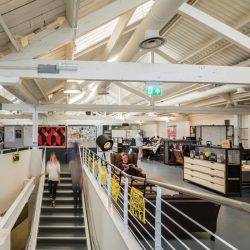 With all challenges come opportunities. Covid-19 will most likely be the single largest challenge and disrupter of a generation. It has the potential to create the greatest significant shift in working behaviours and standards of the past hundred years. Workspace consultants, enlightened clients, designers, researchers and commentators have been hammering the agile / home/ remote working drum for the past twenty years or more, waiting patiently for this kind of opportunity. More →
With all challenges come opportunities. Covid-19 will most likely be the single largest challenge and disrupter of a generation. It has the potential to create the greatest significant shift in working behaviours and standards of the past hundred years. Workspace consultants, enlightened clients, designers, researchers and commentators have been hammering the agile / home/ remote working drum for the past twenty years or more, waiting patiently for this kind of opportunity. More →
June 8, 2020
The paradox of how routines can help us be more productive and creative
by Nick Chater • Comment, Flexible working
 Former US president Barack Obama famously had a wardrobe full of identical suits. As a world leader, life presents more than enough big decisions – Obama’s reasoning was that it made sense to minimise the complexity of the small decisions. Artists are often thought of as rather different. Francis Bacon, for example, had a tempestuous personal life, a notoriously chaotic studio, and a penchant for late nights at London’s seedier drinking clubs. Yet even Bacon’s working habits were surprisingly regular – usually starting work at first light with strong tea, before heading out around midday for his first glass of champagne.
Former US president Barack Obama famously had a wardrobe full of identical suits. As a world leader, life presents more than enough big decisions – Obama’s reasoning was that it made sense to minimise the complexity of the small decisions. Artists are often thought of as rather different. Francis Bacon, for example, had a tempestuous personal life, a notoriously chaotic studio, and a penchant for late nights at London’s seedier drinking clubs. Yet even Bacon’s working habits were surprisingly regular – usually starting work at first light with strong tea, before heading out around midday for his first glass of champagne.




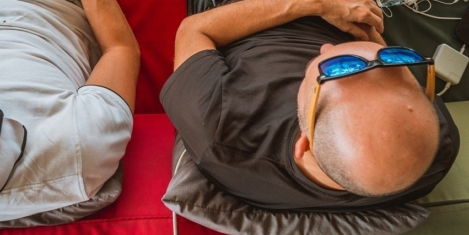
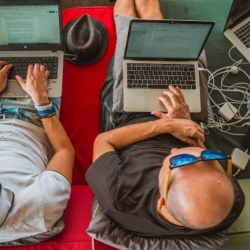 According to research conducted by conference call provider
According to research conducted by conference call provider 

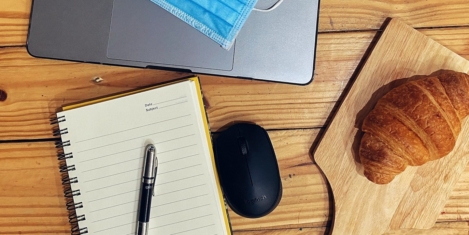
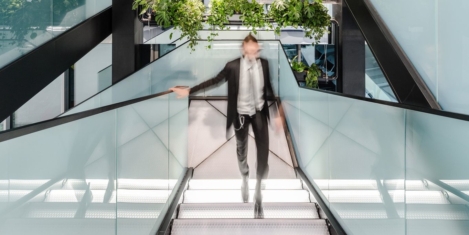

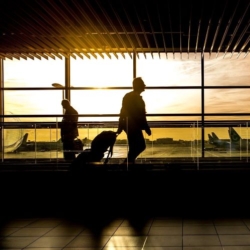 Environmental concerns and the changing work landscape could lead to a noticeable drop in both domestic and international business travel, as nearly half of UK workers (48 percent) are concerned about its negative environmental impact, according to new research from
Environmental concerns and the changing work landscape could lead to a noticeable drop in both domestic and international business travel, as nearly half of UK workers (48 percent) are concerned about its negative environmental impact, according to new research from 

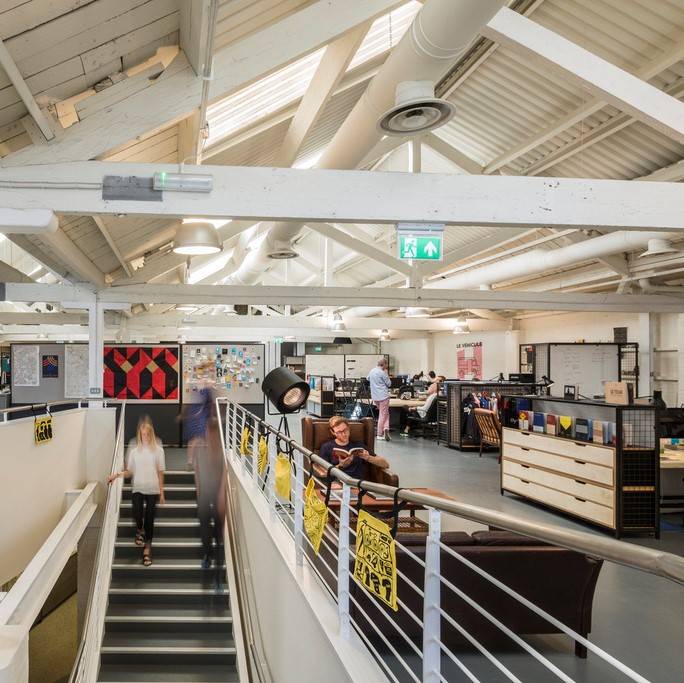
















June 30, 2020
Cracking the issue of work after lockdown
by Mark Eltringham • Comment, Flexible working, Workplace design